2004-2012 Programs
2012 Book: Silent Spring
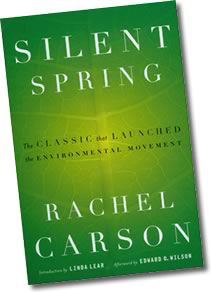 Fifty years after publication, Silent Spring remains one of the most influential books
of the 20th century. Carson's eloquent, carefully researched arguments about the effect
of pesticides on our environment helped launch the US environmental movement, led
to a ban on DDT, and laid the ground work for the Environmental Protection Agency.
Most importantly, Silent Spring framed fundamental questions about life on our planet
and about the responsibility we have to each other and to other species, questions
as important today as in 1962.
Fifty years after publication, Silent Spring remains one of the most influential books
of the 20th century. Carson's eloquent, carefully researched arguments about the effect
of pesticides on our environment helped launch the US environmental movement, led
to a ban on DDT, and laid the ground work for the Environmental Protection Agency.
Most importantly, Silent Spring framed fundamental questions about life on our planet
and about the responsibility we have to each other and to other species, questions
as important today as in 1962.
2011 Common Experience Book: The Immortal Life of Henrietta Lacks
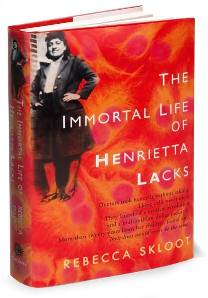 This book is about more than one woman and how her cells grew beyond her; it’s about
more than a young reporter starting out to write her first book. It’s also about a
group of people on a mission to learn the truth about the life and death of Henrietta
Lacks and the ongoing life of the cancer cells taken from her. A variety of voices
and perspectives join in many different stories that paint a gripping picture of the
profound effects that Henrietta’s death and the immortal HeLa cell line had on her
family, the future of biomedical research, and the health of millions.
This book is about more than one woman and how her cells grew beyond her; it’s about
more than a young reporter starting out to write her first book. It’s also about a
group of people on a mission to learn the truth about the life and death of Henrietta
Lacks and the ongoing life of the cancer cells taken from her. A variety of voices
and perspectives join in many different stories that paint a gripping picture of the
profound effects that Henrietta’s death and the immortal HeLa cell line had on her
family, the future of biomedical research, and the health of millions.
The author, Rebecca Skloot, touches upon a diverse range of topics, from race to ethics to the relationship between science and religion, shining a light upon Henrietta’s unknowing contribution to medical and scientific research. The reader is immersed in a journey that begins with a young black woman who lived in poverty and died from cervical cancer in 1951. The journey tracks Skloot’s efforts to discover a forgotten history and help Henrietta’s family (especially her daughter Deborah) in their struggle to understand the circumstances surrounding Henrietta’s death and what it means that part of her is still alive. The human story is woven into the world of scientific research with compassion, insight, and challenging questions. Who is allowed to profit from parts of your body? At what point do you, as a patient, forfeit ownership of samples taken from your body? What constitutes informed consent? This story is not only for scientists, sociologists, and ethicists. It speaks to everyone who is interested in the human experience, calling us to come together to learn about successes and mistakes of our past and to work to make the world a better place.
2010 Common Experience Book: Confessions of a Radical Industrialist
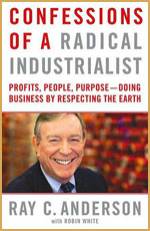 In 1994, Interface founder and chairman Ray Anderson set an audacious goal for his
commercial carpet company: to take nothing from the earth that can’t be replaced by
the earth. Now, in the most inspiring business book of our time, Anderson leads the
way forward and challenges all of industry to share that goal.
In 1994, Interface founder and chairman Ray Anderson set an audacious goal for his
commercial carpet company: to take nothing from the earth that can’t be replaced by
the earth. Now, in the most inspiring business book of our time, Anderson leads the
way forward and challenges all of industry to share that goal.
The Interface story is a compelling one: In 1994, making carpets was a toxic, petroleum-based process, releasing immense amounts of air and water pollution and creating tons of waste. Fifteen years after Anderson’s “spear in the chest” revelation, Interface has:
- Cut greenhouse gas emissions by 82% - Cut fossil fuel consumption by 60% - Cut waste by 66% - Cut water use by 75% - Invented and patented new machines, materials, and manufacturing processes - Increased sales by 66%, doubled earnings, and raised profit margins
With practical ideas and measurable outcomes that every business can use, Anderson shows that profit and sustainability are not mutually exclusive; businesses can improve their bottom lines and do right by the earth.
2009 Common Experience Book: The Ape And The Sushi Master
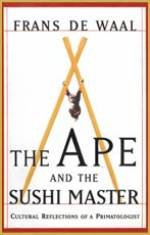 What if apes had their own culture rather than an imposed human version? What if they
reacted to situations with behavior learned through observation of their elders (culture)
rather than with pure genetically coded instinct (nature)? In answering these questions,
eminent primatologist Frans de Waal corrects our arrogant assumption that humans are
the only creatures to have made the leap from the natural to the cultural domain.The
book's title derives from an analogy de Waal draws between the way behavior is transmitted
in ape society and the way sushi-making skills are passed down from sushi master to
apprentice. Like the apprentice, young apes watch their group mates at close range,
absorbing the methods and lessons of each of their elders' actions. Responses long
thought to be instinctive are actually learned behavior, de Waal argues, and constitute
ape culture.A delightful mix of intriguing anecdote, rigorous clinical study, adventurous
field work, and fascinating speculation, The Ape and the Sushi Master shows that apes
are not human caricatures but members of our extended family with their own resourcefulness
and dignity.
What if apes had their own culture rather than an imposed human version? What if they
reacted to situations with behavior learned through observation of their elders (culture)
rather than with pure genetically coded instinct (nature)? In answering these questions,
eminent primatologist Frans de Waal corrects our arrogant assumption that humans are
the only creatures to have made the leap from the natural to the cultural domain.The
book's title derives from an analogy de Waal draws between the way behavior is transmitted
in ape society and the way sushi-making skills are passed down from sushi master to
apprentice. Like the apprentice, young apes watch their group mates at close range,
absorbing the methods and lessons of each of their elders' actions. Responses long
thought to be instinctive are actually learned behavior, de Waal argues, and constitute
ape culture.A delightful mix of intriguing anecdote, rigorous clinical study, adventurous
field work, and fascinating speculation, The Ape and the Sushi Master shows that apes
are not human caricatures but members of our extended family with their own resourcefulness
and dignity.
2008 Common Experience Book: Three Cups Of Tea
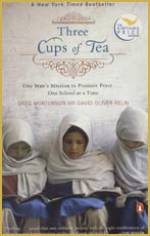 In Three Cups Of Tea: One Man’s Mission to Promote Peace. . . One School at a Time,
Greg Mortenson, and acclaimed journalist David Oliver Relin, recount the unlikely
journey that led Mortenson from a failed attempt to climb Pakistan’s K2, the world’s
second highest mountain, to successfully building schools in some of the most remote
regions of Afghanistan and Pakistan. By replacing guns with pencils, rhetoric with
reading, Mortenson combines his unique background with his intimate knowledge of the
third-world to fight terrorism with books, not bombs, and successfully bring education
and hope to remote villages in central Asia. Three Cups of Tea is at once an unforgettable
adventure and the inspiring true story of how one man really is changing the world—one
school at a time.
In Three Cups Of Tea: One Man’s Mission to Promote Peace. . . One School at a Time,
Greg Mortenson, and acclaimed journalist David Oliver Relin, recount the unlikely
journey that led Mortenson from a failed attempt to climb Pakistan’s K2, the world’s
second highest mountain, to successfully building schools in some of the most remote
regions of Afghanistan and Pakistan. By replacing guns with pencils, rhetoric with
reading, Mortenson combines his unique background with his intimate knowledge of the
third-world to fight terrorism with books, not bombs, and successfully bring education
and hope to remote villages in central Asia. Three Cups of Tea is at once an unforgettable
adventure and the inspiring true story of how one man really is changing the world—one
school at a time.
2007 Common Experience Book: Mountains Beyond Mountains
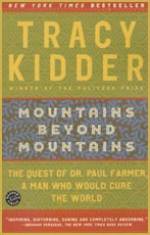 Kidder tells the powerful and inspiring story of Dr. Paul Farmer, who, in 1987, with
the help of friends—including a quiet, Boston philanthropist— co-founded Partners
In Health, a non profit organization which has addressed the medical needs of hundreds
of thousands of patients in Haiti, Peru, Russia and Boston, Massachusetts, as well
as changed the way the medical world approaches the treatment of diseases such as
multidrug-resistant tuberculosis and AIDS. The philosophy that permeates all of Farmer’s
work is that "the only real nation is humanity,” a belief also embodied in Partners
In Health. Mountains Beyond Mountains follows Farmer from the United States to Haiti,
Peru, Cuba, and Russia, always changing minds and practices. At the heart of Kidder’s
book is the story of a life based on hope and the understanding of the Haitian proverb
“Beyond mountains there are mountains”; in other words, as you solve one problem,
another problem appears, and so you go on and try to solve that one too.
Kidder tells the powerful and inspiring story of Dr. Paul Farmer, who, in 1987, with
the help of friends—including a quiet, Boston philanthropist— co-founded Partners
In Health, a non profit organization which has addressed the medical needs of hundreds
of thousands of patients in Haiti, Peru, Russia and Boston, Massachusetts, as well
as changed the way the medical world approaches the treatment of diseases such as
multidrug-resistant tuberculosis and AIDS. The philosophy that permeates all of Farmer’s
work is that "the only real nation is humanity,” a belief also embodied in Partners
In Health. Mountains Beyond Mountains follows Farmer from the United States to Haiti,
Peru, Cuba, and Russia, always changing minds and practices. At the heart of Kidder’s
book is the story of a life based on hope and the understanding of the Haitian proverb
“Beyond mountains there are mountains”; in other words, as you solve one problem,
another problem appears, and so you go on and try to solve that one too.
2006 Common Experience Book: Nickel and Dimed
 Millions of Americans work full time, year round, for poverty-level wages. In 1998,
Barbara Ehrenreich decided to join them. She was inspired in part by the rhetoric
surrounding welfare reform, which promised that a job -- any job -- can be the ticket
to a better life. But how does anyone survive, let alone prosper, on $6 an hour? To
find out, Ehrenreich left her home, took the cheapest lodgings she could find, and
accepted whatever jobs she was offered. Moving from Florida to Maine to Minnesota,
she worked as a waitress, a hotel maid, a cleaning woman, a nursing-home aide, and
a Wal-Mart sales clerk. She lived in trailer parks and crumbling residential motels.
Very quickly, she discovered that no job is truly "unskilled," that even the lowliest
occupations require exhausting mental and muscular effort. She also learned that one
job is not enough; you need at least two if you int to live indoors.
Millions of Americans work full time, year round, for poverty-level wages. In 1998,
Barbara Ehrenreich decided to join them. She was inspired in part by the rhetoric
surrounding welfare reform, which promised that a job -- any job -- can be the ticket
to a better life. But how does anyone survive, let alone prosper, on $6 an hour? To
find out, Ehrenreich left her home, took the cheapest lodgings she could find, and
accepted whatever jobs she was offered. Moving from Florida to Maine to Minnesota,
she worked as a waitress, a hotel maid, a cleaning woman, a nursing-home aide, and
a Wal-Mart sales clerk. She lived in trailer parks and crumbling residential motels.
Very quickly, she discovered that no job is truly "unskilled," that even the lowliest
occupations require exhausting mental and muscular effort. She also learned that one
job is not enough; you need at least two if you int to live indoors.
Nickel and Dimed reveals low-rent America in all its tenacity, anxiety, and surprising
generosity -- a land of Big Boxes, fast food, and a thousand desperate stratagems
for survival. Read it for the smoldering clarity of Ehrenreich's perspective and for
a rare view of how "prosperity" looks from the bottom. You will never see anything
-- from a motel bathroom to a restaurant meal -- in quite the same way again.
2005 Common Experience Book: Another Way Home
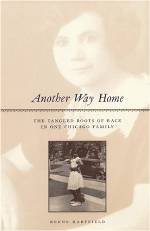 In her prologue to Another Way Home, Ronne Hartfield notes the dearth of stories about
African Americans who have occupied the area of mixed race with ease and harmony for
generations. Her moving family history is filled with such stories, told in beautifully
crafted and unsentimental prose. Spanning most of the twentieth century, Hartfield's
book celebrates the special occasion of being born and reared in a household where
miscegenation was the rule rather than the exceptionwhere being a woman of mixed race
could be a fundamental source of strength, vitality, and courage.Hartfield begins
with the early life of her mother, Day Shepherd. Born to a wealthy British plantation
owner and the mixed-race daughter of a former slave, Day negotiates the complicated
circumstances of plantation life in the border country of Louisiana and Mississippi
and, as she enters womanhood, the quadroon and octoroon societies of New Orleans.
Equally a tale of the Great Migration,Another Way Hometraces Day's journey to Bronzeville,
the epicenter of black Chicago during the first half of the twentieth century. Here,
through the eyes of Day and, ultimately, her daughter, we witness the bustling city
streets and vibrant middle-class culture of this iconic black neighborhood. We also
relive crucial moments in African American history as they are experienced by the
author's family and others in Chicago's South Side black community, from the race
riots of 1919 and the Great Depression to the murder of Emmett Till and the dawn of
the civil rights movement.Throughout her book, Hartfield portrays mixed-race Americans
navigating the challenges of their lives with resilience and grace, makingAnother
Way Homean intimate and compelling encounter with one family's response to our racially
charged culture.
In her prologue to Another Way Home, Ronne Hartfield notes the dearth of stories about
African Americans who have occupied the area of mixed race with ease and harmony for
generations. Her moving family history is filled with such stories, told in beautifully
crafted and unsentimental prose. Spanning most of the twentieth century, Hartfield's
book celebrates the special occasion of being born and reared in a household where
miscegenation was the rule rather than the exceptionwhere being a woman of mixed race
could be a fundamental source of strength, vitality, and courage.Hartfield begins
with the early life of her mother, Day Shepherd. Born to a wealthy British plantation
owner and the mixed-race daughter of a former slave, Day negotiates the complicated
circumstances of plantation life in the border country of Louisiana and Mississippi
and, as she enters womanhood, the quadroon and octoroon societies of New Orleans.
Equally a tale of the Great Migration,Another Way Hometraces Day's journey to Bronzeville,
the epicenter of black Chicago during the first half of the twentieth century. Here,
through the eyes of Day and, ultimately, her daughter, we witness the bustling city
streets and vibrant middle-class culture of this iconic black neighborhood. We also
relive crucial moments in African American history as they are experienced by the
author's family and others in Chicago's South Side black community, from the race
riots of 1919 and the Great Depression to the murder of Emmett Till and the dawn of
the civil rights movement.Throughout her book, Hartfield portrays mixed-race Americans
navigating the challenges of their lives with resilience and grace, makingAnother
Way Homean intimate and compelling encounter with one family's response to our racially
charged culture.
2004 Common Experience Book: The Spirit Catches You and You Fall Down
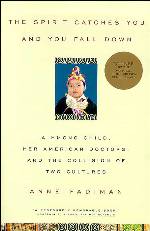 When three-month-old Lia Lee Arrived at the county hospital emergency room in Merced,
California, a chain of events was set in motion from which neither she nor her parents
nor her doctors would ever recover. Lia's parents, Foua and Nao Kao, were part of
a large Hmong community in Merced, refugees from the CIA-run "Quiet War" in Laos.
The Hmong, traditionally a close-knit and fiercely people, have been less amenable
to assimilation than most immigrants, adhering steadfastly to the rituals and beliefs
of their ancestors. Lia's pediatricians, Neil Ernst and his wife, Peggy Philip, cleaved
just as strongly to another tradition: that of Western medicine. When Lia Lee Entered
the American medical system, diagnosed as an epileptic, her story became a tragic
case history of cultural miscommunication.
When three-month-old Lia Lee Arrived at the county hospital emergency room in Merced,
California, a chain of events was set in motion from which neither she nor her parents
nor her doctors would ever recover. Lia's parents, Foua and Nao Kao, were part of
a large Hmong community in Merced, refugees from the CIA-run "Quiet War" in Laos.
The Hmong, traditionally a close-knit and fiercely people, have been less amenable
to assimilation than most immigrants, adhering steadfastly to the rituals and beliefs
of their ancestors. Lia's pediatricians, Neil Ernst and his wife, Peggy Philip, cleaved
just as strongly to another tradition: that of Western medicine. When Lia Lee Entered
the American medical system, diagnosed as an epileptic, her story became a tragic
case history of cultural miscommunication.
Parents and doctors both wanted the best for Lia, but their ideas about the causes
of her illness and its treatment could hardly have been more different. The Hmong
see illness aand healing as spiritual matters linked to virtually everything in the
universe, while medical community marks a division between body and soul, and concerns
itself almost exclusively with the former. Lia's doctors ascribed her seizures to
the misfiring of her cerebral neurons; her parents called her illness, qaug dab peg--the
spirit catches you and you fall down--and ascribed it to the wandering of her soul.
The doctors prescribed anticonvulsants; her parents preferred animal sacrifices.